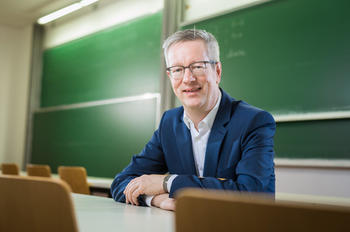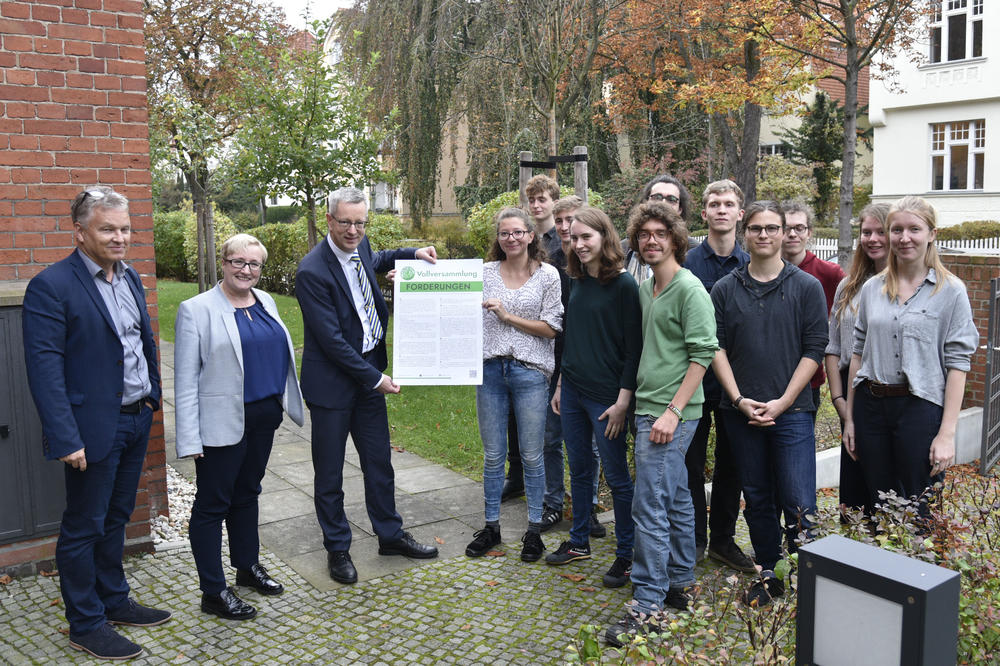“We will continue to work toward our goal of a climate-neutral Freie Universität Berlin”
The Fridays for Future initiative called for a Global Day of Climate Action on September 25, 2020. We spoke to Professor Günter M. Ziegler, the president of Freie Universität – about our climate targets on campus.
Oct 26, 2020
An extensive energy management system was introduced at Freie Universität Berlin between 2000 and 2001 – resulting in major savings that freed up the university’s budget while also giving climate protection targets a boost.
Image Credit: Freie Universität Berlin
Sustainability is an issue that affects all aspects of life at Freie Universität. That’s why the university has set itself the highly ambitious goal of achieving climate neutrality within the next few years. Following Fridays for Future’s call for a global climate strike back in September, campus.leben sat down with the president of Freie Universität, Günter M. Ziegler, for the latest updates on the university’s climate targets.
Professor Ziegler, climate protection has been overshadowed in the news by the ongoing Covid-19 pandemic over the last six months. Freie Universität has also faced unprecedented challenges, with empty lecture halls and the summer semester moving online. Have we forgotten about the climate crisis?
Not at all. We are still experiencing a climate emergency – the switch to a digital semester doesn’t change that fact. The climate crisis is not something that we can simply put on the back burner, even if the past semester was a totally new experience for our students and members of the university. All of us were well and truly stretched to our limits due to these unusual circumstances. We had to be very creative this semester, but that didn’t make it any less challenging or stressful.
Back in December of last year, when Freie Universität Berlin declared a state of climate emergency, we set ourselves the goal of achieving climate neutrality as an organization by 2025. We’ve been working on reaching this target during the pandemic – and we’re sticking to it.
Has the goal of achieving climate neutrality gotten easier or harder in light of the ongoing pandemic?
It’s hard to say which or whether. In any case, we are consolidating the very solid foundations we have built for ourselves. Freie Universität Berlin began focusing on improving its energy management 20 years ago, which was earlier than most other universities. This has been an incredible success, and we have managed to reduce our energy consumption by 25 percent in the meantime. We have also reduced carbon dioxide emissions related to energy consumption in our buildings by 80 percent.
However, we have faced challenges in other areas, such as procuring climate-neutral district heating. The pandemic has not brought about any changes for us here. Our goal of climate neutrality by 2025 remains highly ambitious in this respect, yet at the same time we have gained many new invaluable insights as a result of the global pandemic.
What kind of insights do you mean?
Well, one example would be our future approach to members of the university going on business trips. Face-to-face contact is typically very important at events like academic conferences. But we will all be taking a much closer look at whether long – and often not particularly climate-friendly – journeys are necessary, and evaluate them on a case-by-case basis.
The fact that it is possible to do so many things remotely is definitely an important lesson we have learned over the last few months. All members of the university have made use of teaching and learning methods as well as electronic communication much more than they ever have before. We have not only collaborated with people on the other side of the world via the internet, but also with colleagues on our team whom we had previously met in person on a regular basis.
October 21, 2019 – students hand a list of demands to Professor Günter M. Ziegler, the president of Freie Universität. At left: Andreas Wanke, head of the Unit for Sustainability and Energy Management and Professor Verena Blechinger-Talcott, a vice p
Image Credit: Jonas Huggins
Even people already familiar with online formats learned and tested out new ways of working. We couldn’t (and still can’t) just travel to meet our cooperative partners or attend conferences, whether we take the environmentally friendly option of traveling by train or jet off into the skies. This has paved the way for academics in gaining new experiences for collaboration within Germany as well as internationally. I think that all members of the university – myself very much included – have had to face a steep learning curve in a short period of time. We plan on making use of the knowledge we have gained in the future.
If university operations are to go ahead in the coming semester under pandemic conditions, will this change mobility on campus?
Yes, of course it will! We want to improve sustainable mobility options on campus. One of our specific measures will be to replace our fleet of 80 vehicles – particularly commercial vehicles and vehicles for research field trips – with electric models. Seeing as a mere ten percent of the above are electric vehicles, we are currently only at the beginning of this process.
At the same time, we are investing in electric freight bicycles that can be used at different sites. Overall, we hope to help make it easier for both employees and students to arrive and move about on campus in the most climate-friendly way possible. Riding to university by bike is the best way to help protect the environment while also getting some healthy exercise.
Will Freie Universität Berlin be taking part in the Global Climate Strike?
The next semester and thus most classes have not yet begun, so we don’t yet know what activities will be taking place. Freie Universität is participating in the second Netzwerk N forum for dialogue, which will take place from September 24 to 26. There are many ongoing discussions and forums that offer universities and colleges the opportunity to brainstorm how best to achieve climate neutrality and transformative learning. Some of these events will be taking place in Berlin and Tübingen, but most of them will be held online.
Schools @ University for Sustainability + Climate Protection, a multi-award-winning educational program, will be taking place at Freie Universität until September 25. Thanks to a meticulously planned hygiene concept, a total 1600 school pupils from 73 classes from across Berlin’s districts are able to come to Freie Universität and participate in 80 interactive workshops. This is something that I’ve really found heartening.
In light of these major challenges, we at Freie Universität Berlin remain open to suggestions and regularly ask ourselves how we can contribute to environmental protection and what we can do better – whether we gain these insights though scientific discussions, policy talks within the higher education sector, teaching events, student initiatives, or we are requested to comment by young protesters.
Kerrin Zielke conducted the interview.
The original German version of this interview was published on September 24, 2020, in campus.leben, the online magazine of Freie Universität Berlin.



